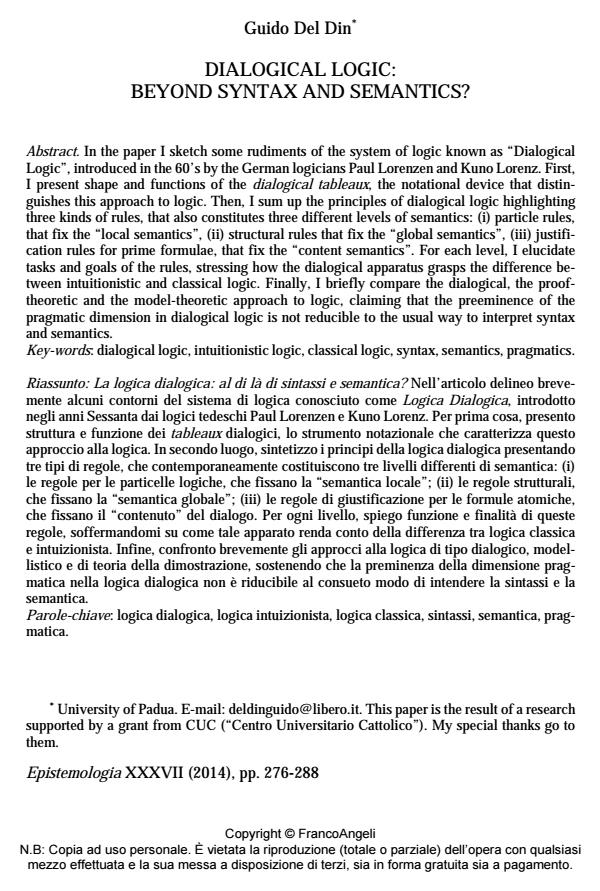Dialogical logic: beyond syntax and semantics?
Journal title EPISTEMOLOGIA
Author/s Guido Del Din
Publishing Year 2015 Issue 2014/2
Language English Pages 13 P. 276-288 File size 78 KB
DOI 10.3280/EPIS2014-002007
DOI is like a bar code for intellectual property: to have more infomation
click here
Below, you can see the article first page
If you want to buy this article in PDF format, you can do it, following the instructions to buy download credits

FrancoAngeli is member of Publishers International Linking Association, Inc (PILA), a not-for-profit association which run the CrossRef service enabling links to and from online scholarly content.
In the paper I sketch some rudiments of the system of logic known as "Dialogical Logic", introduced in the 60’s by the German logicians Paul Lorenzen and Kuno Lorenz. First, I present shape and functions of the dialogical tableaux, the notational device that distinguishes this approach to logic. Then, I sum up the principles of dialogical logic highlighting three kinds of rules, that also constitutes three different levels of semantics: (i) particle rules, that fix the "local semantics", (ii) structural rules that fix the "global semantics", (iii) justification rules for prime formulae, that fix the "content semantics". For each level, I elucidate tasks and goals of the rules, stressing how the dialogical apparatus grasps the difference between intuitionistic and classical logic. Finally, I briefly compare the dialogical, the prooftheoretic and the model-theoretic approach to logic, claiming that the preeminence of the pragmatic dimension in dialogical logic is not reducible to the usual way to interpret syntax and semantics.
Keywords: Dialogical logic, intuitionistic logic, classical logic, syntax, semantics, pragmatics.
- Rahman S., Clerbout N. (2013). Constructive Type Theory and the Dialogical Turn, paper available at univ-lille3.academia.edu/ShahidRahman.
- Rahman S., Tulenheimo T. (2009). From games to dialogues and back: Towards a general
- frame for validity. In Majer O. et al. (eds.) (2009), Games: Unifying Logic, Language and Philosophy, Dordrecht, Springer, pp. 153-208.
- Redmond J., Fontaine M. (2011). How to Play Dialogues. An Introduction to Dialogical Logic, London, College Publications.
- Smullyan R. (1968). First Order Logic, New York, Dover Publications.
- Stegmüller W. (1964). Remarks on the completeness of logical systems relative to the validity of concepts of P. Lorenzen and K. Lorenz, Notre Dame Journal of Formal Logic, 5, pp. 81-112.
- Beth E. (1955). Semantic Entailment and Formal Derivability. In Mededelingen der Koninklijke Nederlandse Akademie van wetenschappen, 18(13), pp. 309-342.
- Felscher W. (1985). Dialogues as a foundation for intuitionistic logic. In Gabbay D., Guenther
- F. (eds.) (1985), Handbook of Philosophical Logic, Dordrecht, Kluwer, pp. 341-372.
- Fitting M. (1969). Intuitionistic Logic, Model Theory and Forcing, Amsterdam, North Holland Publishing.
- Haas G. (1980). Hypothesendialoge, konstruktiver Sequenzkalkül und die Rechtfertigung von Dialograhmenregeln. In Gethman C.F. (ed.) (1980), Theorie des wissenschaftlichen Argumentierens, Frankfurt am Main., Suhrkamp, pp. 136-161.
- Hartmann D. (1990). Konstruktive Fragelogik. Vom Elementarsatz zur Logik von Frage und Antwort, Mannheim / Wien / Zürich, Bibliographisches Institut.
- Kamlah W., Lorenzen P. (1967). Logische Propädeutik oder Vorschule des vernünftigen Redens, Mannheim, Bibliographisches Institut.
- Lorenzen P. (1958). Logik und Agon. In Atti del XIII Congresso Internazionale di Filosofia, Venezia, pp. 187-194, reprinted in Lorenzen P., Lorenz K. (1978), pp. 1-8.
- Lorenzen P. (1987). Lehrbuch der konstruktiven Logik und Wissenschaftstheorie, Mannheim / Wien / Zürich, Bibliographisches Institut.
- Lorenzen P., Lorenz K. (1978). Dialogische Logik, Darmstadt, Wissenschaftliche Buchgesellschaft.
- Popper K. (1963). Conjectures and Refutations: The Growth of Scientific Knowledge, London, Routledge.
- Rahman S. (1993).Über Dialoge, Protologische Kategorien und andere Seltenheiten, Frankfurt am Main, Peter Lang.
Guido Del Din, Dialogical logic: beyond syntax and semantics? in "EPISTEMOLOGIA" 2/2014, pp 276-288, DOI: 10.3280/EPIS2014-002007